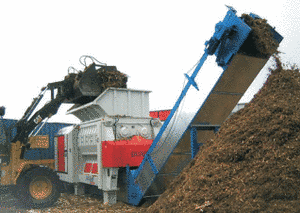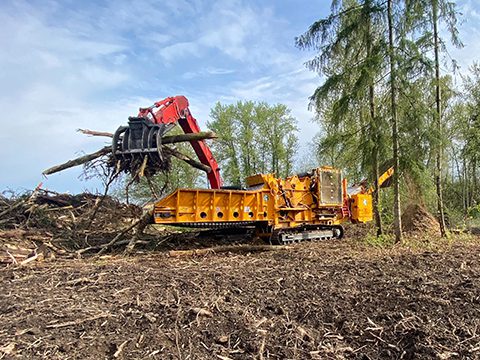Wood Grinders: Open Effectiveness with Cutting-Edge Equipment for Wood Handling
Wood Grinders: Open Effectiveness with Cutting-Edge Equipment for Wood Handling
Blog Article
Unlock the Possible of Reusing With Advanced Timber Grinders: Streamline Operations and Minimize Waste
One such option that holds terrific assurance is the innovative wood mill, a modern technology that has the potential to unlock the real abilities of recycling. By simplifying operations and minimizing waste, these mills supply an unique technique to dealing with the difficulties of timber waste handling. In this discussion, we will certainly check out the answers to these concerns and dropped light on the untapped possibility of sophisticated timber mills in transforming the reusing industry.
Reliable Timber Waste Handling
Reliable wood waste handling is important for enhancing recycling procedures and optimizing the usage of this valuable resource. Wood waste, such as timber, lumber, and pallets, is a substantial result of different markets, consisting of building, furniture production, and demolition. To properly manage and recycle this waste, advanced timber grinders have become a crucial option.
Advanced wood mills are designed to successfully refine wood waste right into reusable products, such as timber chips or compost, which can be made use of for various objectives. These grinders use powerful cutting devices and progressed shredding innovations to break down wood waste right into smaller sized, more manageable pieces. By reducing the size of the waste, the mills assist in simpler transportation and storage.
In addition to size reduction, advanced timber mills likewise play an important duty in dividing impurities, such as nails and screws, from the wood waste. This ensures that the refined product is totally free and tidy from impurities, making it appropriate for a vast array of applications.
Effective wood waste handling not just helps streamline recycling procedures but likewise minimizes waste. By processing and reusing wood waste, businesses can decrease their reliance on virgin sources, preserve power, and minimize the ecological impact connected with traditional waste disposal techniques.
Sustainability in Waste Monitoring
Advertising sustainable practices and environmental responsibility, waste monitoring in the context of wood processing involves implementing reliable and environment-friendly methods. In today's world, where environmental problems go to the leading edge, it is vital for sectors to take on lasting waste administration methods. With the boosting demand for wood items and the succeeding increase in wood waste, it has actually become crucial to locate cutting-edge services that decrease the influence on the environment.
Sustainability in waste management involves a number of crucial facets. It is crucial to minimize the amount of waste created in the timber processing industry. By implementing efficient wood grinding methods, such as making use of advanced timber mills, the market can significantly minimize the volume of waste generated. These mills can refining huge quantities of wood waste right into smaller, a lot more workable items, which can then be repurposed or recycled.
Secondly, lasting waste administration concentrates on reusing and reusing products whenever possible. Wood waste can be transformed into beneficial sources such as biomass fuel or garden compost. By repurposing wood waste, the sector can reduce its dependence on virgin materials and reduce the demand for land fill area.
Last but not least, lasting waste monitoring includes reducing the ecological influence of garbage disposal. Wood waste that can not be recycled or recycled need to be disposed of in an eco responsible manner. This may involve proper sorting and segregation of waste, in addition to making use of modern technologies that transform waste right into energy through processes like anaerobic digestion or incineration with power recovery.
Boosted Recycling Procedures
To optimize wood waste monitoring and make the most of reusing initiatives, the execution of sophisticated timber grinders is crucial for boosting reusing procedures (wood grinders). These devices offer an array of benefits that can significantly improve the effectiveness and efficiency of recycling procedures
Among the vital benefits of sophisticated timber mills is more helpful hints their capacity to process a large variety of timber waste materials. From cages and pallets to tree branches and stumps, these mills can properly damage down wood waste right into smaller, more manageable pieces. This not only assists in easier transport and storage yet also makes it possible for the recycling of a better volume of timber waste.

Additionally, advanced timber grinders are geared up with functions that improve security and reduce downtime. These check out this site devices are developed to run efficiently and reliably, lessening the need for upkeep and repairs. This enables recycling operations to run smoothly and constantly, ultimately increasing productivity and decreasing costs.
Taking Full Advantage Of Resource Usage
With the capability to effectively refine a wide variety of timber waste materials, advanced timber mills play a pivotal duty in maximizing resource use within recycling operations. These devices are developed to efficiently convert timber waste into useful timber chips or mulch, which can then be made use of in various sectors such as landscape design, biomass energy production, and pet bed linen.
By utilizing advanced wood grinders, recycling operations can considerably minimize the quantity of wood waste that ends up in garbage dumps, helping to conserve valuable land fill space and minimize ecological impact. The refined wood waste can be repurposed and made use of as a sustainable resource, adding to a more sustainable and circular economy.
Additionally, advanced timber mills enable reusing procedures to draw out the optimum value from timber waste materials. These equipments have the capacity to produce regular and high-grade timber chips or mulch, which can be sold as beneficial items in the marketplace. This not only produces earnings for reusing procedures yet also develops chances for the growth of brand-new markets and partnerships.
Along with optimizing source use, advanced wood mills additionally add to the general performance of reusing procedures. These machines are made to deal with huge volumes of timber waste swiftly and effectively, minimizing processing time and labor prices. They additionally have security features and advanced modern technologies that ensure trustworthy and smooth operation, reducing downtime and making the most directory of productivity.
Decreasing Ecological Footprint

Among the essential benefits of making use of innovative timber mills is the production of useful products from timber waste. These mills have the capability to convert wood waste into wood chips, compost, or biomass gas, which can be utilized in different industries such as landscape design, power, or building and construction manufacturing. By changing waste right into valuable items, these mills add to an extra circular and sustainable economy.
Additionally, progressed timber grinders are geared up with sophisticated innovations that boost their effectiveness and lower power usage. They are developed to handle big volumes of wood waste in a brief amount of time, allowing reusing operations to streamline their processes and enhance efficiency. This not only decreases the environmental effect of reusing procedures however likewise boosts the overall performance of timber waste management.
Final Thought
To conclude, progressed timber mills supply a promising service to open the capacity of recycling by enhancing procedures and decreasing waste. These grinders allow efficient wood waste handling, boost recycling operations, take full advantage of resource application, and reduce the environmental footprint. wood grinders. By embracing these modern technologies, organizations can add to an extra lasting waste administration system, making certain the efficient application of resources and minimizing environmental impact

Report this page